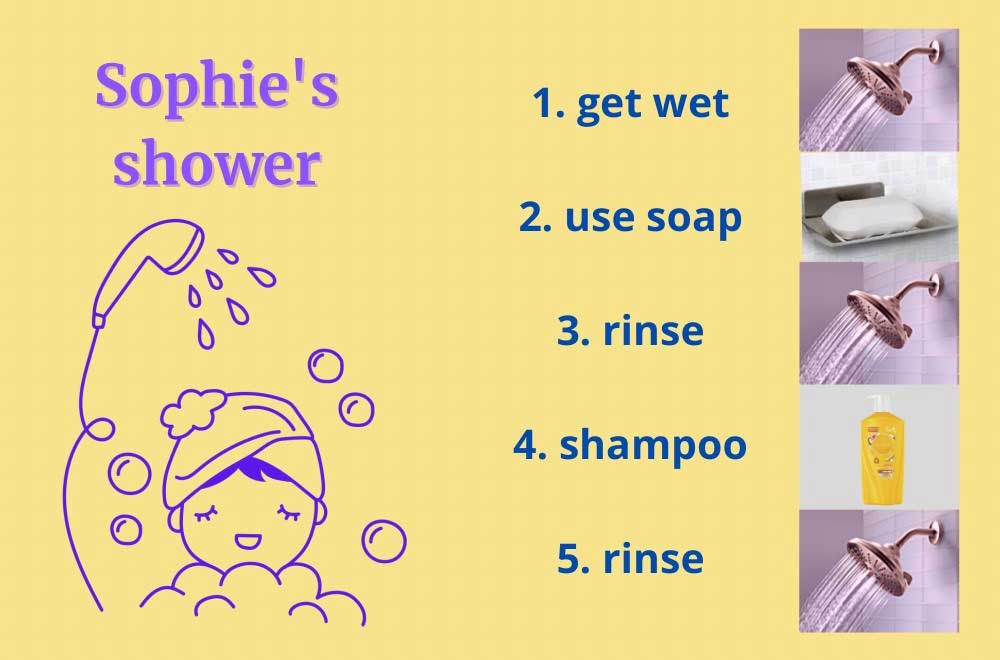
It’s the same every night…when Sophie (10) gets in the shower, I tell her to use shampoo. I ask her if she’s washing her hair and she says yes … then she comes out of the bathroom and her hair is dry. When I confront her, she gets upset and says she’s not lying…. Is this FASD?
If you sometimes feel that you have no idea why your child is behaving a certain way – you are not alone. This week I had talked to Carmel, a kinship carer who was struggling to make sense of Sophie’s behaviour. Carmel felt tired, frustrated and a bit cross – was Sophie trying to push her buttons? Why else would she do this, night after night?
Children with FASD can’t tell us why they behave the way they do – they are not aware that their brain works differently so they can’t explain their impulsivity or their difficulties understanding instructions. Children with FASD need adults to do the detective work around behaviour and figure out the ‘why’.
Being a FASD Detective*
Making the connections between your child’s brain and behaviour takes curiosity, patience and a calm approach. It’s not always something that we can do in the heat of the moment. To understand your child’s unique brain, it can help to look back on their test results or talk to their therapist/s.
Behaviour is communication of something the child/person can not verbalize…and usually the message is some variant of “I am overwhelmed, please help me” Be a BRAIN DETECTIVE! Understand FASD and your child’s brain differences. Step back, OBSERVE, and ask yourself what your kiddo needs!
> Always Remember the Brain:30 Strategies for parents of a child with FASD, Indiana NOFAS
If Carmel interprets Sophie’s behaviour without understanding her brain, she might jump to the conclusion that Sophie is:
- lazy – she can’t be bothered washing her hair so she’s lying about it
- unmotivated – she doesn’t care about hygiene
- avoidant – she won’t do anything if she can get away with it
- attention seeking – she wants me to do it for her
- deceptive – she just can’t tell the truth
- selfish – she only does things she wants to, not what I need her to do.
All these assumptions are based on the idea that Sophie is in control – that’s she making a choice. But what if it’s can’t, not won’t? If we recognise the behaviours as symptoms of a brain-based condition, we can see other possibilities. Sophie might be:
- distracted – she really means to wash her hair but once she’s in the shower, she started thinking about something else
- forgetful – she meant to do it, but when Carmel called her to get out of the shower, it was too late
- struggling to process information – she couldn’t really hear Carmel with the water running, so she just yelled out “yes”
- overwhelmed – she really doesn’t like the feeling or smell of shampoo
- confabulating – she can’t remember whether she washed her hair or not, but once Carmel asked, she said yes, and now that feels like a real memory.
- sensitive – she knows she’s done something wrong but isn’t sure what, and now she’s in trouble, so she feels defensive.
I asked Carmel if she could think of a time when Sophie behaved differently – were there days when she can remember all the steps, and follow them?
Carmel said no, that this happens all the time.
I asked whether Sophie would behave differently if Carmel told her they would be doing a fun activity after her shower. Would this motivate her?
Carmel felt that it would make no difference, and that Sophie would be more likely to rush her shower and miss other steps too, like forgetting to use soap.
Just by taking time to reflect, Carmel was able to notice that Sophie had never independently remembered all the steps involved in showering, even when there was an incentive. Even though she felt Sophie should know better, she realised that the behaviour wasn’t within Sophie’s control.
We reviewed what Carmel already knew about Sophie’s brain and how it might be affecting her behaviour. Carmel knew from past assessments that Sophie has difficulties with:
- attention – she loses focus easily and gets distracted
- memory – she doesn’t always retain information
- verbal processing – she can’t always understand verbal instructions
- sensory processing – she doesn’t like strong scents
- planning and organisation – remembering steps in order.
Carmel realised that Sophie needed more help to keep focused on the steps involved in the task, and needed reminders. She was aware that Sophie processes visual information better than verbal information so it made sense to use a visual chart. Carmel also agreed that Sophie needed Carmel to check she had done all the steps before getting out of the shower.

Carmel said that Sophie didn’t need reminders to turn the tap on or off, or to dry herself, so we came up with a picture chart with just the steps she needed help with. Because Sophie can be a concrete thinker, Carmel agreed it would be better to use take photos – that way Sophie wouldn’t confuse the shampoo and the lotion.
By making the connection between brain function and behaviour, Carmel felt more accepting of Sophie’s behaviour and was able to come up with a new strategy. She could also see that Sophie would need help to use the chart which we broke down into:
- teach
- remind
- supervise.
Carmel put the chart up in the shower and we worked out the next steps:
- Carmel would show Sophie the chart and explain it.
- When it was time for Sophie’s shower, Carmel would indicate the chart and remind her of the steps.
When it was time for Sophie to get out of the shower, Carmel would check if she had done the steps – if not, she would wait while Sophie did them.
The final step for Carmel will be to watch and see if it works. If the visual schedule doesn’t work, Carmel might need to use her detective skills to work out why. Sophie might need more teaching, more reminding or more supervision.
*The idea of a FASD detective isn’t original – if you search online you will find other examples of this concept as a helpful approach for parents and carers.
Prue Walker is a social worker and FASD consultant who has been working with and advocating for those with FASD since 2008. She provides FASD education, coaching and consulting services to families and organisations. Contact Prue to discuss your needs.
8 magic keys behaviour brain and behaviour FASD FASD education FASD Training fetal alcohol spectrum disorder Neurobehavioural approach parenting strategies toolkit
Contact
+61 419 878 260
Email Prue
We acknowledge the Traditional Owners of the country on which we work, the Wurundjeri people of the Kulin Nations, and we pay respect to their Elders past, present and emerging. We recognise that sovereignty was never ceded.
Copyright © 2021 Prue Walker · Log out
